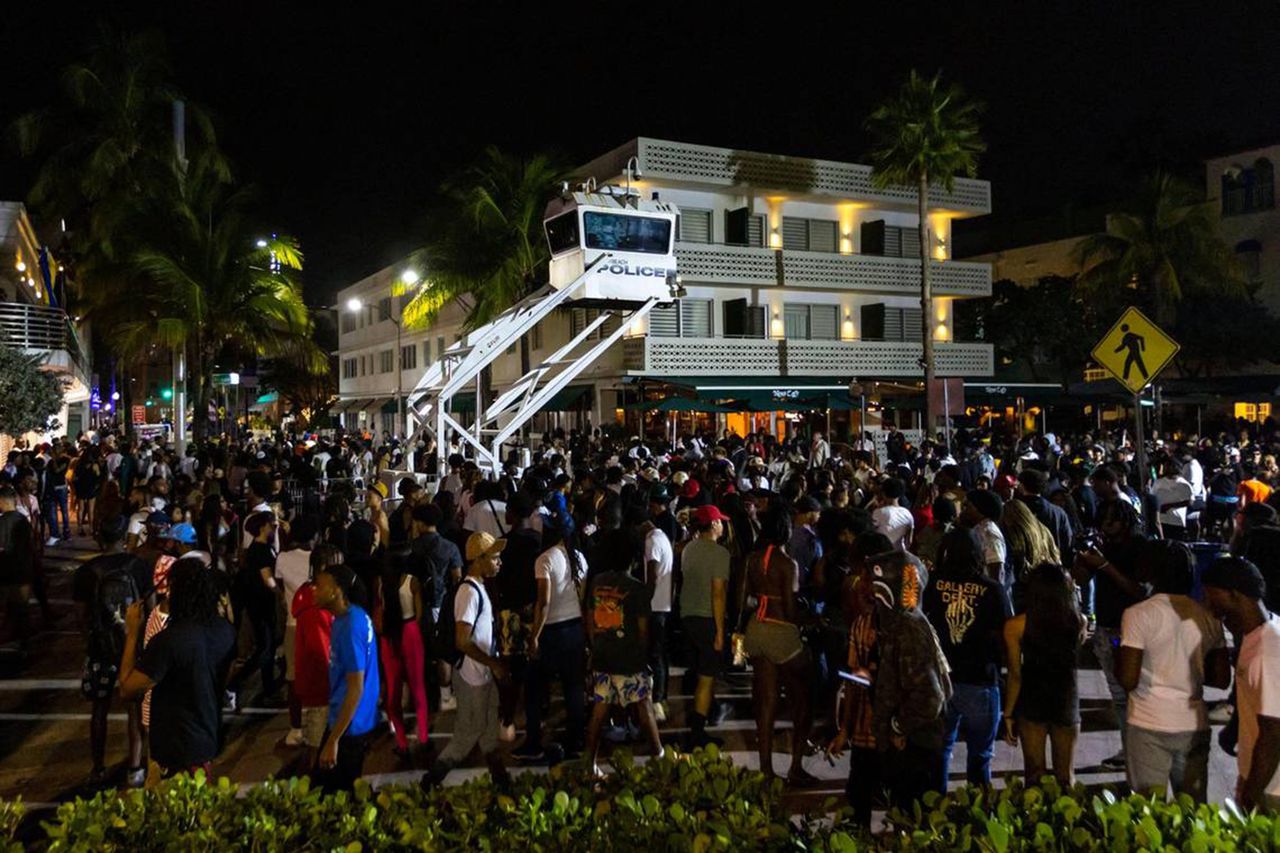Miami Beach mayor: ‘We don’t want spring break in our city’
The city of Miami Beach declared a state of emergency and announced a midnight curfew Sunday after two deadly shootings rocked Ocean Drive this weekend amid huge spring break crowds.
City Manager Alina Hudak issued the order after a fatal shooting around 3:30 a.m. Sunday on Ocean Drive near 11th Street. City officials initially declined to impose a curfew after one person was killed and another wounded in a shooting Friday night around 10:30 p.m. on Ocean Drive but changed course after the second shooting Sunday.
The curfew will take effect Sunday night into Monday and apply to all of South Beach, an area bounded by 23rd Street and Dade Boulevard on the north, Government Cut on the south, Biscayne Bay on the west and the Atlantic Ocean on the east. The area includes Ocean Drive and other party strips in the city’s entertainment district.
People won’t be allowed out in those areas from midnight to 6 a.m. Violators could be arrested, the city said.
In a press release, the city said the decision was “in response to the two shootings and the excessively large and unruly crowds, and to mitigate dangerous and illegal conduct.”
“It is the necessary and the most narrowly-tailored approach to include the entire South Beach area … in the emergency curfew area in order to prevent the migration of massive crowds from the Ocean Drive area into the surrounding residential areas,” Hudak wrote in the emergency order.
Miami Beach Mayor Dan Gelber released a video message shortly after the curfew was announced.
“As is the case with most serious crime in our city, both shootings were between visitors to Miami Beach and did not involve residents. In both cases, police were literally seconds away from the incidents, and arrests were made within minutes,” Gelber said. “That said, it is clear that even an unprecedented police presence could not prevent these incidents from occurring.”
This state of emergency and curfew is only in effect until Monday. Because Hudak can only issue emergency orders over 72-hour periods, the Miami Beach City Commission will meet Monday to possibly impose another curfew next weekend, from March 23 to 27.
Under the curfew, people must leave commercial businesses before midnight, the city said. Hotels can operate past midnight but only service their own guests. Restaurants can operate after curfew for delivery only, according to the order, with takeout prohibited.
The curfew won’t apply to emergency services, people going to and from work, and residents and hotel guests requiring access to their homes and hotels.
“Residents are advised to return to the City prior to 11:59 p.m., in order to avoid any potential traffic delays once the curfew has taken effect,” the city said in its press release.
The city’s programming aimed at calming the spring break atmosphere, including an “Art on the Drive” event that has Ocean Drive shut down to cars this weekend from Fifth to 13th streets, is expected to conclude around 6 p.m. Sunday to allow police and city officials to prepare for the curfew.
The sale of alcohol for off-premises consumption will also be banned after 6 p.m.
Gelber said in his video message that he believes the city’s daytime programming has helped with crowd control and that daytime incidents and arrests are down from last year. Still, he said, “the volume of people in our city, the unruly nature of too many, and the presence of guns has created a peril that cannot go unchecked, especially in the evenings.”
The decision mirrors what happened during spring break last year, when Miami Beach declared a midnight curfew in South Beach after two shooting incidents on Ocean Drive injured five people over the third weekend in March.
In 2021, the city declared an 8 p.m. curfew during spring break and also shut down major causeways to prevent people from crossing Biscayne Bay and entering Miami Beach. The city did not shut its causeways last year and will not do so this year, officials said, citing concerns about the legality of the move.
The city’s curfews and police responses have been controversial in the past. In 2021, police used SWAT teams and pepper spray bullets to try to clear Ocean Drive and control crowds after curfew, prompting criticism and allegations of racism. In 2020, the Miami-Dade chapter of the NAACP called on the city’s police chief to resign after videos showed police officers roughing up Black spring breakers.
“As I have said many times, we don’t ask for spring break in our city. We don’t want spring break in our city. It’s too rowdy, brings too much disorder, and is simply too difficult to police,” Gelber said. “While most come here to enjoy the amenities of Miami Beach … the few that come with bad intentions and the presence of guns creates a wholly intolerable situation. Notwithstanding an enormous deployment of police, at times it remains a tinder.”
Gelber said police had seized more than 70 guns over the past three weeks.
This weekend’s shootings shattered what had been a relatively peaceful and calm spring break in South Beach this month. Crowds grew starting Thursday, gathering on the sand during the day before moving to Ocean Drive.
Multiple stampede-type incidents took place on Ocean Drive near Eighth Street on Friday and Saturday, though it wasn’t clear what caused them and they didn’t appear to result in significant injuries. Videos of several fights on and near Ocean Drive were also circulating on social media.
City officials had hoped a heavy police presence and new programming, including concerts, fitness-related events and a volleyball tournament, would lead to fewer problems in the area this year.
———
©2023 Miami Herald. Visit miamiherald.com. Distributed by Tribune Content Agency, LLC.
